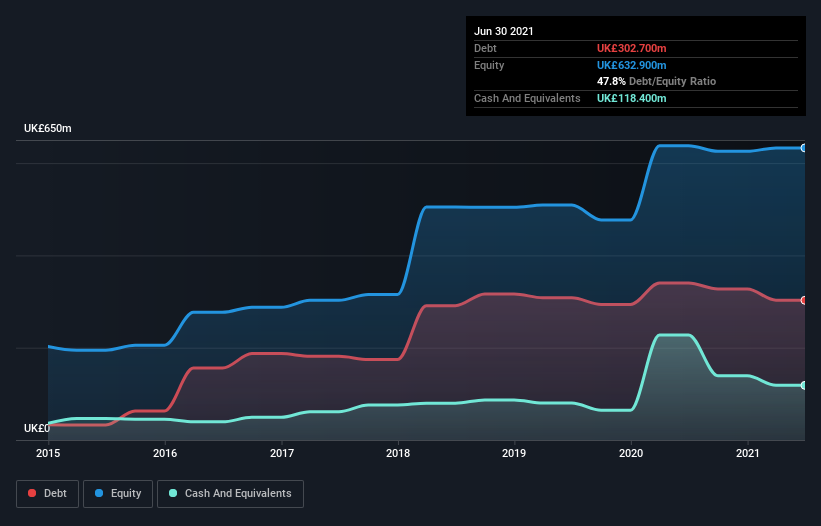- United Kingdom
- /
- Pharma
- /
- LSE:DPH
Here's Why Dechra Pharmaceuticals (LON:DPH) Can Manage Its Debt Responsibly

Legendary fund manager Li Lu (who Charlie Munger backed) once said, 'The biggest investment risk is not the volatility of prices, but whether you will suffer a permanent loss of capital.' So it might be obvious that you need to consider debt, when you think about how risky any given stock is, because too much debt can sink a company. Importantly, Dechra Pharmaceuticals PLC (LON:DPH) does carry debt. But should shareholders be worried about its use of debt?
Why Does Debt Bring Risk?
Generally speaking, debt only becomes a real problem when a company can't easily pay it off, either by raising capital or with its own cash flow. Ultimately, if the company can't fulfill its legal obligations to repay debt, shareholders could walk away with nothing. However, a more common (but still painful) scenario is that it has to raise new equity capital at a low price, thus permanently diluting shareholders. Having said that, the most common situation is where a company manages its debt reasonably well - and to its own advantage. When we think about a company's use of debt, we first look at cash and debt together.
View our latest analysis for Dechra Pharmaceuticals
What Is Dechra Pharmaceuticals's Net Debt?
You can click the graphic below for the historical numbers, but it shows that Dechra Pharmaceuticals had UK£302.7m of debt in June 2021, down from UK£340.0m, one year before. On the flip side, it has UK£118.4m in cash leading to net debt of about UK£184.3m.

How Healthy Is Dechra Pharmaceuticals' Balance Sheet?
Zooming in on the latest balance sheet data, we can see that Dechra Pharmaceuticals had liabilities of UK£155.8m due within 12 months and liabilities of UK£425.4m due beyond that. Offsetting these obligations, it had cash of UK£118.4m as well as receivables valued at UK£119.2m due within 12 months. So its liabilities outweigh the sum of its cash and (near-term) receivables by UK£343.6m.
Of course, Dechra Pharmaceuticals has a market capitalization of UK£5.31b, so these liabilities are probably manageable. But there are sufficient liabilities that we would certainly recommend shareholders continue to monitor the balance sheet, going forward.
We use two main ratios to inform us about debt levels relative to earnings. The first is net debt divided by earnings before interest, tax, depreciation, and amortization (EBITDA), while the second is how many times its earnings before interest and tax (EBIT) covers its interest expense (or its interest cover, for short). This way, we consider both the absolute quantum of the debt, as well as the interest rates paid on it.
Dechra Pharmaceuticals has net debt of just 1.5 times EBITDA, indicating that it is certainly not a reckless borrower. And it boasts interest cover of 9.9 times, which is more than adequate. On top of that, Dechra Pharmaceuticals grew its EBIT by 48% over the last twelve months, and that growth will make it easier to handle its debt. The balance sheet is clearly the area to focus on when you are analysing debt. But ultimately the future profitability of the business will decide if Dechra Pharmaceuticals can strengthen its balance sheet over time. So if you want to see what the professionals think, you might find this free report on analyst profit forecasts to be interesting.
Finally, a business needs free cash flow to pay off debt; accounting profits just don't cut it. So the logical step is to look at the proportion of that EBIT that is matched by actual free cash flow. In the last three years, Dechra Pharmaceuticals's free cash flow amounted to 36% of its EBIT, less than we'd expect. That weak cash conversion makes it more difficult to handle indebtedness.
Our View
The good news is that Dechra Pharmaceuticals's demonstrated ability to grow its EBIT delights us like a fluffy puppy does a toddler. But truth be told we feel its conversion of EBIT to free cash flow does undermine this impression a bit. Taking all this data into account, it seems to us that Dechra Pharmaceuticals takes a pretty sensible approach to debt. That means they are taking on a bit more risk, in the hope of boosting shareholder returns. The balance sheet is clearly the area to focus on when you are analysing debt. However, not all investment risk resides within the balance sheet - far from it. We've identified 1 warning sign with Dechra Pharmaceuticals , and understanding them should be part of your investment process.
If, after all that, you're more interested in a fast growing company with a rock-solid balance sheet, then check out our list of net cash growth stocks without delay.
New: Manage All Your Stock Portfolios in One Place
We've created the ultimate portfolio companion for stock investors, and it's free.
• Connect an unlimited number of Portfolios and see your total in one currency
• Be alerted to new Warning Signs or Risks via email or mobile
• Track the Fair Value of your stocks
Have feedback on this article? Concerned about the content? Get in touch with us directly. Alternatively, email editorial-team (at) simplywallst.com.
This article by Simply Wall St is general in nature. We provide commentary based on historical data and analyst forecasts only using an unbiased methodology and our articles are not intended to be financial advice. It does not constitute a recommendation to buy or sell any stock, and does not take account of your objectives, or your financial situation. We aim to bring you long-term focused analysis driven by fundamental data. Note that our analysis may not factor in the latest price-sensitive company announcements or qualitative material. Simply Wall St has no position in any stocks mentioned.
About LSE:DPH
Dechra Pharmaceuticals
Dechra Pharmaceuticals PLC develops, manufactures, regulates, markets, and sells veterinary pharmaceuticals and related products for veterinarians.
Reasonable growth potential and overvalued.


